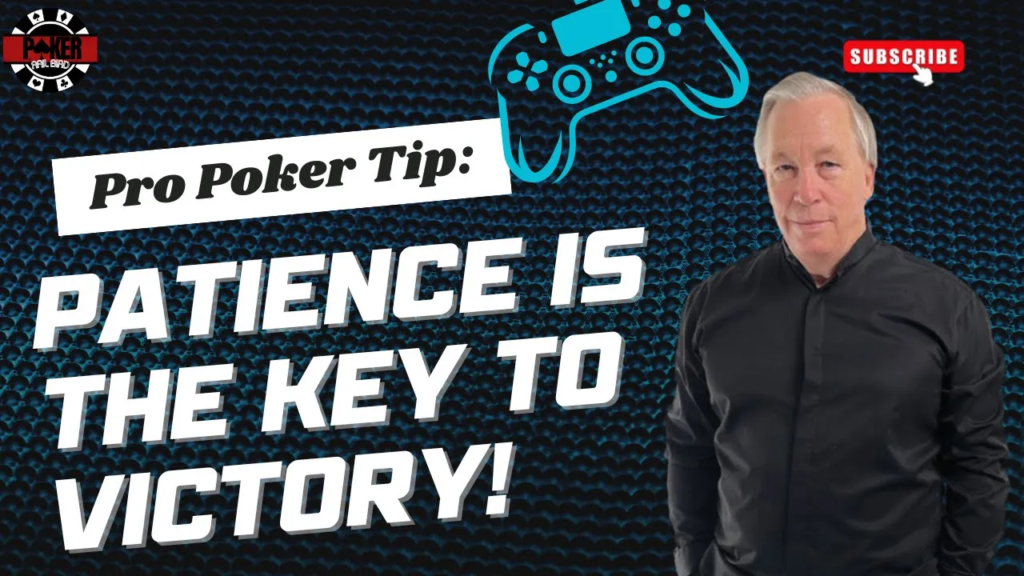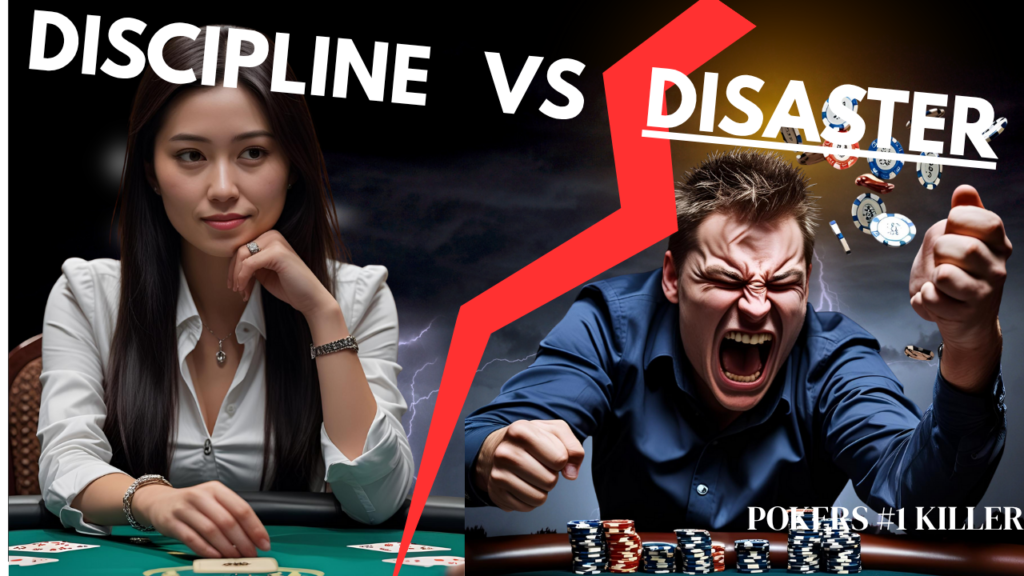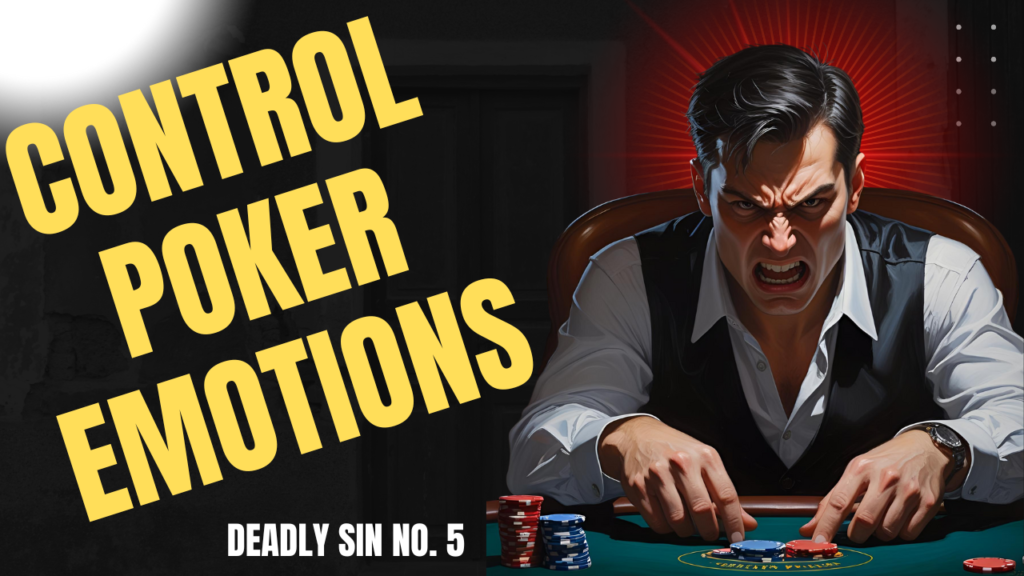DEADLY SIN NO. 6: POOR CONCENTRATION IN POKER
HOW TO GO THE DISTANCE
Poker Is a Game of Decisions — and Distractions
Poor concentration in poker, more than any other flaw, undermines the game’s core: it’s not just about cards, but decisions made in a storm of distractions.
You’re not just calculating odds. You’re watching hands, reading players, listening to table talk, managing your image, and tracking your own betting patterns — all while trying to anticipate your opponents’ next moves. And yet, despite this complexity, most players treat concentration like an afterthought. They look at their phone mid-hand. They sip drinks, crack jokes, and float in and out of the game mentally.

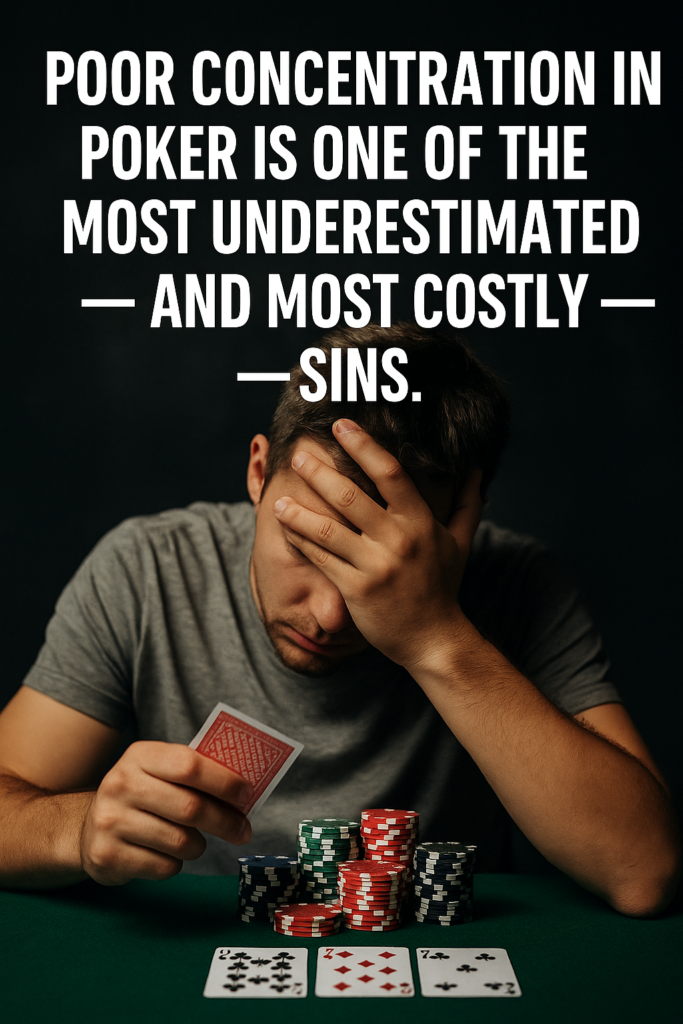
Poor concentration in poker is one of the most underestimated — and most costly — sins. It quietly chips away at your edge, turning winnable sessions into slow leaks. A single missed detail, one moment of zoning out, can turn a +EV situation into a busted stack.
In this article, we’ll break down why concentration is one of poker’s most essential yet overlooked skills. We’ll explore how poor focus leads to bad decisions, how external and internal distractions kill profitability, and how to develop laser-sharp attention that pays real dividends at the table.
Because in poker, the biggest edge is often the one no one notices — until it’s gone.
OBSERVATION VS WATCHING
Poor concentration in poker punishes passive players—not just those who play too many hands, but those who sit quietly, fold frequently, and seem tuned in, yet fall prey to a dangerous leak: watching instead of observing.
This distinction isn’t just semantics—it’s fundamental.
Consider Sherlock Holmes and Dr. Watson. In A Scandal in Bohemia, Holmes asks Watson how many steps lead up to their apartment at 221B Baker Street. Watson, caught off guard, admits he has no idea. Holmes replies, “You have seen, but you have not observed.” Watson had walked those stairs a hundred times. But he didn’t register the detail. He saw—but he didn’t absorb.
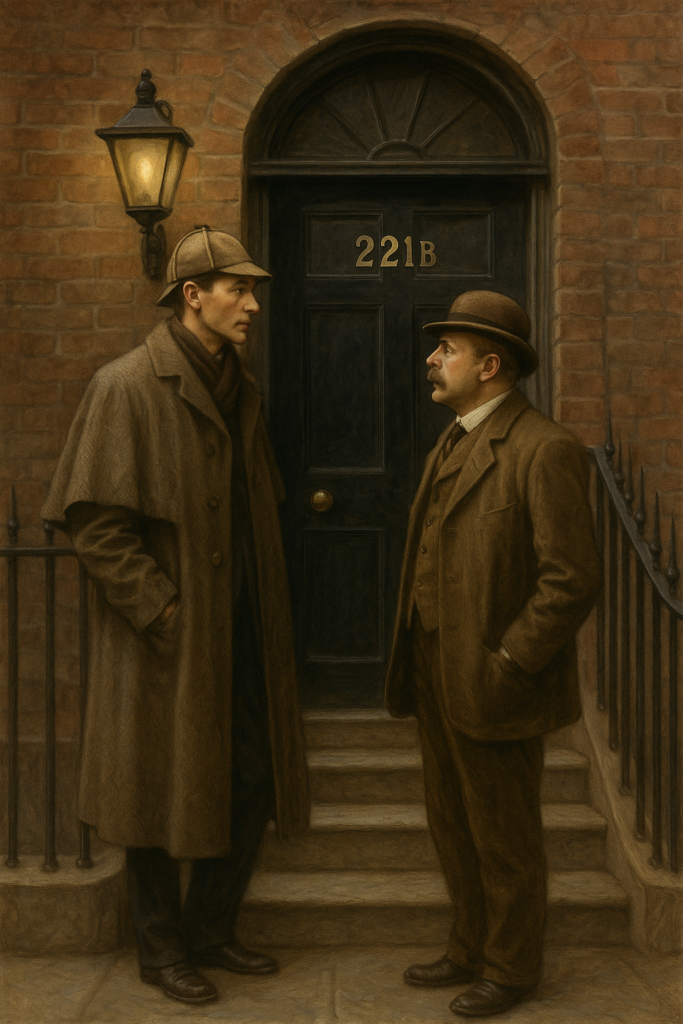
WHY POOR CONCENTRATION IN POKER SABOTAGES YOUR EDGE
Most poker players do the same due to poor concentration in poker.
They glance at their opponents. They see the dealer burn and turn, and they watch chips being bet. But they don’t observe the full story: betting patterns, tempo changes, micro-expressions, chip-handling quirks, table banter, card protection habits, hesitation points, showdowns—and how it all connects.
True observation is active engagement. It demands more than eyesight. It demands curiosity, memory, and mental indexing. It’s Sherlock Holmes reading a room—and recalling every detail when it matters.
And yet, in a world of distractions—phones, conversations, music, and even fatigue—many players mentally drift, losing these precious details hand after hand.
The cost? Leaks in your game you don’t even know exist.
You miss the tight player who suddenly bets light, or you overlook the hesitation that revealed strength. We forget who folded last orbit from the big blind. You fail to register who’s running hot, frustrated, tilted, or bored. You surrender information—voluntarily—by simply not paying attention.
In the long run, this leak bleeds win rate just as surely as poor hand selection or chasing gutshots. You can’t exploit what you don’t observe. And in live poker, where physical tells and betting behavior provide edges no solver can replicate, the failure to observe is a strategic blind spot.
CONCENTRATION AS A MENTAL DISCIPLINE
Poor concentration in poker isn’t a flaw you’re born with—it’s a challenge you can overcome, as concentration is a discipline built through repetition, structure, and conscious effort.
The biggest myth in poker is that great players are somehow naturally focused. That they sit down, zone in, and absorb every detail as if they were born with laser vision. That’s nonsense.
Top players train their minds to be present.
They develop rituals that anchor their attention. They create environments that minimize distraction. And they rehearse mental frameworks that sort signal from noise. And when their focus drifts—which it inevitably does—they know how to recover quickly, without tilt, shame, or spiraling into emotional play.
Here’s the core truth:
Concentration in poker isn’t about staring harder. It’s about thinking with clarity and intention.
Like a muscle, concentration fatigues with overuse. This is why four-hour poker sessions differ from 40-minute ones. That’s why late-night mistakes creep in. That’s why the player who folds 80% of hands isn’t necessarily focused—he might just be mentally drifting.
But also like a muscle, concentration strengthens with practice.
Just as you would train your memory to track hand histories, or your math skills to calculate pot odds, you can train your focus to stay sharp hand after hand—even when you’re not in the pot.
Techniques like focused breathing, table scanning rituals, and intentional note-taking build mental endurance. So does eliminating distractions: no phone scrolling between hands, no passive conversations, no zoning out during big hands you’re not in.
Because every hand you’re dealt—and every hand you witness—is an opportunity to gather data, refine reads, and gain an edge.
In this game, the player who notices more wins more.
SIDEBAR: TOOLS TO TRAIN YOUR CONCENTRATION
Overcoming poor concentration in poker isn’t about “trying harder.” It’s about developing deliberate mental habits that sharpen awareness, filter distractions, and keep your mind from drifting when it matters most. Like a muscle, attention can be trained—and here are five powerful tools to help you do just that.
PRE-SESSION MENTAL ANCHORS
MINDFULNESS BETWEEN HANDS
What happens before you sit down matters. Top players often use a pre-session ritual to center themselves. Whether it’s reviewing a hand chart, closing your eyes for 60 seconds of focused breathing, or repeating a key mantra (“tight is right,” “observe the table”), these mental anchors prime your focus and create a clear boundary between life and poker.
Pro Tip: Never enter a session in “mental multitask mode.” Check your phone, close all loops, and commit fully to the table for the next few hours. .
Mindfulness isn’t about yoga or crystals—it’s about being fully present in the moment. Between hands, instead of checking your phone or zoning out, use micro-mindfulness resets:
• Focus on one breath.
• Scan the table silently—who’s stacking chips? Who just lost a pot?
• Note the texture of the last flop.
THE OBSERVATIONAL JOURNAL
THE ONE ORBIT CHALLENGE
Keep a small notepad—or a mental checklist—during sessions. At the end of every orbit, ask yourself:
• Who has position on me?
• Who’s playing loose?
• Who limped twice and folded to a raise?
• What were the stack sizes in that big pot?
You’re not just gathering data. You’re training your brain to track patterns automatically. Over time, this becomes a fluid, intuitive skill—but it starts by deliberately building the muscle.
For one full orbit (9 hands), commit to full concentration—no distractions, no autopilot. Even if you fold every hand, watch the action, make mental notes, and play detective.
Then pause and ask:
“How much did I really see?”
Start with one orbit per session. Then try two. You’ll be stunned at how much you were missing before—and how quickly your brain adapts once challenged.
TABLE TALK FILTERS
Not all conversation is harmless. Table banter, dealer chatter, TVs, and background noise can pull you out of game state. That doesn’t mean becoming antisocial—but it means having filters.
• Before the flop: Smile, nod, but stay alert.
• During a hand: Shut it all out. Tunnel in.
• Post-hand: Debrief mentally before engaging.
Concentration isn’t constant. It’s adaptive. Learn when to toggle your attention on and off, with purpose.
These 5-second exercises anchor your mind, keeping it from drifting into distractions, boredom, or emotional residue from the last hand.
Sherlock Holmes vs. Dr. Watson:
As Holmes famously told Watson, “You see, but you do not observe.” Observation is active. Watching is passive. Every hand is a chance to engage—not just in play, but in the behavior, rhythm, and psychology of those around you.
Don’t confuse poor concentration in poker with lack of ability. Concentration is not a gift—it’s a habit built through reps, just like any other poker skill. Integrate these tools one session at a time, and you’ll begin to notice not just more, but more that matters.
THE PSYCHOLOGY OF DISTRACTION & WHY IT'S WORSE THAN YOU THINK
Poor concentration in poker transforms minor annoyances—like a buzzing phone, a noisy opponent, or a dealer cracking jokes—into psychological sabotage that erodes your edge from the inside out.
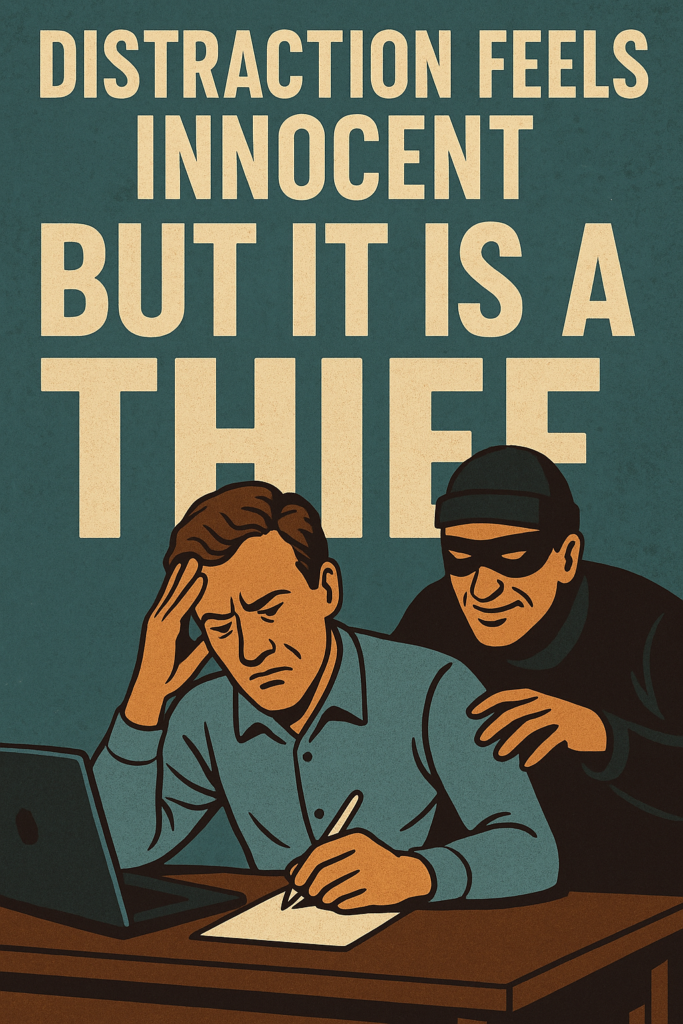
Distractions don’t show up like villains. They show up dressed as:
• Curiosity (“I wonder what he’s watching on his phone?”)
• Social bonding (“Let me comment on that hand.”)
• Boredom relief (“Let me check the sports scores.”)
Each one seems minor—but each one steals cognitive bandwidth. And when you need it most—in a critical river decision or a multi-way pot—you come up short. Not because you’re bad at poker, but because your mental RAM is already used up.
YOUR BRAIN HATES STILLNESS
Human brains are wired to seek novelty and stimulation. In a long poker session—especially when you’re card-dead—your brain goes hunting. It scans for anything to entertain itself:
• What’s that guy drinking?
• Anything good on the TV?
• How many chips does seat 3 have?
• Maybe I should check my messages…
This isn’t weakness. It’s biology. Your default mode network (DMN) is designed to drift when not actively engaged. And poker—filled with waiting, folding, and silence—triggers the DMN constantly.
If you’re not consciously interrupting that pattern, your brain will default to distraction every single session.
The Cost of Micro-Distractions
Even a 5-second lapse—glancing at your phone or thinking about dinner—can cause you to:
• Miss a tell
• Misread a stack
• Miscalculate pot odds
• Forget who’s in the hand
• Misremember the action
These aren’t just mistakes. They’re invisible losses. You don’t realize you missed something—so you blame variance or bad luck. But often, the root cause is poor concentration in poker.
MENTAL FATIQUE DOESN'T LOOK LIKE WHAT YOU THINK
FOCUS IS FRAGILE & DISTRACTION IS STICKY
You won’t notice fatigue as yawning or drooping eyes. It shows up more subtly:
• A looser call than normal
• A skipped continuation bet
• A passive check with a semi-bluff
• A half-hearted raise when a shove was ideal
You tell yourself, “It just felt right.” But often, it wasn’t feel—it was mental depletion. And unlike physical fatigue, it’s hard to detect. That makes it even more dangerous.
Once broken, concentration doesn’t instantly reboot. When you look away—even for a second—it takes time to mentally re-enter the game. The emotional residue of that text message or thought about work lingers.
Reboot lag is real. The brain needs 20 seconds to re-stabilize deep focus after interruption. Multiply that by a dozen distractions, and you’ve wasted minutes of prime mental real estate.
Bottom Line: Poker Punishes the Distracted
In a game where every edge matters, poor concentration in poker is one of the most expensive leaks you’ll never see on a stat sheet.
• You don’t get to review the hand you weren’t paying attention to.
• You can’t fold a hand you weren’t observing properly.
• You’ll never adjust to a player you didn’t notice shifting gears.
Poker doesn’t forgive missed details. And distraction ensures you miss them
BUILDING A DISTRACTION-FREE POKER ENVIRONMENT
Poor concentration in poker thrives in chaotic environments, but the solution isn’t sheer willpower—it’s structure. Great players don’t rely on mental toughness—they engineer their environment to minimize interference.
Let’s build that environment, piece by piece.
ELIMINATE UNNECESSARY STIMULATION
CONTROL YOUR PHYSICAL SPACE
Distraction thrives on stimulation—lights, sounds, movement. Your job is to reduce those sensory triggers:
• No earbuds (unless you’re actively using white noise or instrumental focus music)
• No scrolling between hands
• No news, sports, or apps open nearby
• Turn off notifications (or better yet, airplane mode)
• Keep your phone out of sight, not just off
Out of sight really does mean out of mind. When your tools for distraction are physically inaccessible, your mind stops reaching for them
Your body influences your brain. Slouched posture, cluttered space, or physical discomfort send signals that focus isn’t necessary.
At home or in a cardroom:
• Sit upright, shoulders relaxed but alert
• Clear clutter from your immediate area
• Keep only poker-relevant tools visible (chip stack, notebook, water)
• Minimize side conversations unless strategically beneficial
A controlled environment sends your brain one signal: This matters. Stay alert.
USE BREAKS STRATEGICALLY
PRE-SESSION RITUALS = MENTAL CUES
No one can sustain elite focus for six hours straight. The key isn’t to avoid fatigue—it’s to anticipate it and build recovery in.
• Take purposeful breaks, not random ones
• Step outside if possible—change of scenery resets mental patterns
• Stretch, hydrate, breathe—physical resets fuel mental clarity
• Don’t check out with social media or YouTube during breaks—it undoes your reset
The goal is not to escape boredom but to return stronger.
Professional athletes use pre-game rituals for a reason—they create mental cues that prime the brain for high performance. You should too.
Examples:
• Review one key concept before play (e.g., stack-to-pot ratio or player type targeting)
• Do 60 seconds of mindful breathing
• Write your primary session goals in a notebook (e.g., “Stay present. No autopilot.”)
Rituals convert intention into behavior. They tell your brain, We’re about to go to work.
CONTROL WHAT YOU CAN-ACCEPT WHAT YOU CAN'T
You can’t control the annoying guy in Seat 8. Or the floor’s bad call. Or the drunk who won’t stop talking. But you can control your reaction to them to avoid poor concentration in poker.
Here’s how:
• Mentally flag table noise as “irrelevant”
• Use mild irritation as a trigger for mindfulness
• Say to yourself: “Back to the hand.”
• Train emotional reset like a muscle—over and over
Poker isn’t about achieving total silence. It’s about mastering internal quiet when things are loud.
THE LONG -TERM CONSEQUENCES OF POOR CONCENTRATION
Poor concentration in poker rarely feels catastrophic in the moment—it’s subtle, like missing a small cue, calling too quickly, or overlooking a sizing tell. But poker isn’t played in moments—it’s played across thousands of decisions.
And that’s where the real danger lies.
MISSED VALUE, MISSED PATTERNS & MISSED PROFIT
Poor concentration in poker doesn’t just cause mistakes—it robs you of opportunities:
• You didn’t notice the fish in Seat 3 has a tell when bluffing.
• You didn’t realize the nit in Seat 7 hasn’t played a hand in 90 minutes.
• You failed to clock the player who only bets half-pot when weak.
These lapses, born from absent attention, compound into thousands in missed EV over time, turning winnable sessions into costly leaks.
Compound Leaks = Downward Spiral
Poor concentration in poker breeds bad habits that trap players in a cycle of stagnation: checking your phone trains your brain to crave dopamine, autopiloting hands erases data for later analysis, and rationalizing missed details—“It probably didn’t matter”—widens the skill gap between focused players and those stuck on autopilot.
The Brain Learns What You Practice
Neuroscience confirms: your brain rewires based on repetition.
If you repeatedly play distracted:
• You train your brain to drift
• You normalize incomplete observation
• You reinforce reaction over reflection
But if you repeatedly return to center—re-anchor your attention, and stay curious—you build a brain that thrives at the table.
Your poker decisions become clearer. Faster. More profitable.
How Many Big Blunders Were Actually Tiny Lapses?
Many players recall the hand that cost them a session:
“I shouldn’t have called that river.”
“I knew he had it. Why did I shove?”
But most blowups stem from hours of poor concentration in poker:
• You weren’t tracking your image.
• You didn’t recall how passive that opponent had been.
• You forgot the pot odds you were being offered.
One bad decision is often the final act in a long drama of distraction.
CONCENTRATION IS A LONG-TERM SKILL INVESTMENT

You study math and psychology. You review hands. And you watch videos.
But none of that pays off if your mind is wandering when the cards are dealt.
Concentration is what activates your edge.
It’s the trait that gives everything else you’ve learned a chance to surface when it counts. When you’re four hours deep. When the pot is huge and everyone else is tired.
That’s when focus becomes a weapon.
TRAINING THE POKER MIND-BUILDING FOCUS LIKE A MUSCLE
Poor concentration in poker undermines even the best strategies, but discipline at the table isn’t about willpower—it’s about training.
The world’s best players—from Phil Ivey to Daniel Negreanu—don’t just have focus. They’ve built it. Like muscle, mental discipline grows through reps, sets, and consistent effort. You don’t lift a barbell once and expect strength. And you don’t sit down once and expect stillness.
In this section, we’ll move from theory to practice—from the why to the how. Below are four proven tools to help you sharpen concentration, reduce drift, and train the most important muscle in poker: your mind.
TOOL 1: THE 25-MINUTE FOCUS DRILL (POMODORO FOR POKER PLAYERS)
TOOL 2: THE DISTRACTION AUDIT
Set a timer for 25 minutes during your next poker study session (or pre-session warm-up if online). No distractions. One task only—reviewing hand histories, reading, or analyzing odds. After 25 minutes, take a 5-minute break.
This technique, inspired by the Pomodoro Method, builds stamina for deep work. Over time, you can increase the interval to 30 or 40 minutes—ideal for live play focus.
Why it works:
It trains the brain to resist context-switching, improving session endurance and in-game decision clarity.
Before your next session, take five minutes and write down everything that typically steals your attention:
• People walking by
• Phone notifications
• Hunger, thirst, temperature
• Internal chatter (worry, tilt, daydreaming)
Then ask yourself: Which of these can I remove, reduce, or plan for in advance?
Why it works:
Naming your distractions weakens their power. Anticipation lets you neutralize them before they strike mid-session, combating poor concentration in poker.
TOOL 3: PRE-SESSION MINDFULNESS ROUTINE
TOOL 4: THE "RESET" STRATEGY
Close your eyes for 2 minutes before you play. Breathe deeply. Feel your feet on the ground. Hear the sounds around you. Count your breath from 1 to 10, then back down.
You’re not trying to “clear your mind.” You’re anchoring yourself in this moment, not the last hand, not the next orbit.
Why it works:
This simple ritual slows the mind, reduces mental chatter, and sets your intention: presence over autopilot.
Even the sharpest minds drift. The key is having a recovery plan.
Try this the next time you catch yourself zoning out or tilting:
- Stand up.
- Walk a lap around the room or table.
- Take three deep breaths—in through the nose, out slowly through the mouth.
- Ask yourself:
“What’s the situation now—not five hands ago?”
Why it works:
It disrupts negative loops, resets your nervous system, and puts you back in a decision-ready mindset.
Start a Focus Journal
After each session, write down one moment when you lost focus and one moment when you were dialed in. Over time, patterns emerge: certain players distract you, certain seats tilt you, certain mistakes happen when you’re hungry or tired.
Why it works:
Journaling creates awareness. Awareness leads to change.
Focus isn’t magic—it’s maintenance.
The pros don’t avoid distraction. They train against it. Just like working out, it’s not about being perfect. It’s about showing up, every day, and doing the reps to overcome poor concentration in poker.
The poker table doesn’t reward potential. It rewards preparation.
EMOTIONAL LEAKS MASQUERADING AS MENTAL FATIQUE
Poor concentration in poker often stems from emotional leaks, not just mental fatigue, and distinguishing between the two is crucial for maintaining your edge.
You may think you’re just tired, distracted, or “not locked in.” But in many cases, what feels like mental fatigue is actually an emotional leak.
That’s why it’s important to distinguish between a lapse in concentration and an unprocessed emotional response that’s hijacking your attention.
WHAT LOOKS LIKE FATIQUE
- You keep zoning out
• You stop paying attention to betting patterns
• You feel like you “don’t care” as much
• You call without thinking, or fold without analysis
• You can’t recall key hands an hour later
…is often something deeper. And more dangerous.
What It Actually Is:
• Frustration from a previous hand you mishandled
• Anger at a specific player who’s been needling you
• Resentment that your good image keeps getting ignored
• Fear after a big bluff backfired
• Shame from losing a big pot you feel you “should have won”
These are emotional leaks. And they are deadly—not because they make you cry or scream, but because they drain your concentration quietly, leading to poor concentration in poker.
Like a leaky faucet, they waste your most precious resource: presence.
THE DISGUISE EFFECT: "i'M JUST TIRED"
When these emotions aren’t acknowledged, the mind labels them as fatigue or boredom. Why?
Because fatigue is safer to admit.
It feels easier to say “I’m just off today” than to confront the deeper truth—that you’re still carrying the weight of earlier mistakes, emotional residue, or insecurity.
The Fix: Reconnection, Not Repression
You don’t need to “push through” or “man up.” That’s not strength—that’s suppression.
What you need is to recognize the emotion, name it, and reconnect with the present moment. Try this three-step process:
- Pause. Step away from the table or close your eyes for 10 seconds.
- Label the Emotion. “That was anger.” “That was ego.” “That was fear.”
- Return with Intention. Take a breath. Say to yourself: “Next hand is a new decision.”
This is emotional discipline. And it restores your mental clarity, combating poor concentration in poker.
Concentration ≠ Suppression
Elite poker players don’t just concentrate better. They process faster.
They feel the sting of a mistake—and recover in seconds. They take the emotional hit—and still make the right play. Because they’ve trained for it.
That’s not cold-bloodedness. That’s emotional maturity.
Final Thought:
Every time you sit at the poker table, you bring two players with you:
• The thinker who knows the odds
• The feeler who reacts to outcomes
If you ignore the second, the first will suffer.
So the next time you feel “tired,” ask yourself:
Am I really tired—or am I distracted by a feeling I haven’t dealt with yet?
That answer might be the edge you’ve been missing.
THE EROSION OF GROWTH-HOW POOR CONCENTRATION IN POKER BLOCKS YOUR PROGRESS
Poor concentration in poker ensures that not all experience is created equal.
One person may say they have ten years of experience building ships—but they’ve really mastered only a single aspect. What they have is one year of experience, repeated ten times. Another person, over those same ten years, might learn every component of construction, from hull design to rigging to engine systems. That person truly has ten years of growth.
Poker is no different.
You could play 10,000 hands and never improve… simply because poor concentration in poker kept you from paying enough attention to learn from them.
Here’s why distraction is such a quiet killer of progress:
NO FOCUS = NO FEEDBACK LOOP
Poker is a game of decisions—and every decision you make contains data. When you’re locked in, you recognize:
• Why your bluff worked.
• Why your value bet got paid.
• How your check-call line was too transparent.
But when poor concentration in poker leaves your mind drifting or bouncing between distractions, you don’t register the patterns. You miss the “why.” And without that feedback, you can’t close the loop.
Learning Requires Presence
Improvement comes from seeing the results of your choices, comparing them to alternatives, and adjusting accordingly. That means noticing:
• Opponent tendencies evolving over time.
• The way board texture interacts with betting lines.
• How one misread early in the hand led to downstream errors.
These are micro lessons. If poor concentration in poker makes you only half-present, you miss 90% of them.
You Plateau Without Even Knowing It
This is the real tragedy: players who “put in the hours” but never get better. They think volume equals mastery, but their sessions are mentally passive—autopilot mode driven by poor concentration in poker. As a result, they develop no new layers of depth, no improved intuition, no strategic precision. Just thousands of hands… played flat.
They’re watching, not learning. Seeing, not observing.
HOW PROS TRAIN FOCUS: FROM PHIL IVEY TO FEDOR HOLZ
Poor concentration in poker separates grinders from elites, but top players like Phil Ivey and Fedor Holz don’t just have focus—they’ve trained it, refined it, and weaponized it.
Let’s look at how the best in the world overcome poor concentration in poker.
Phil Ivey and Fedor Holz: Masters of Presence
Phil Ivey’s “scary” table presence comes from intense focus—he watches every hand, even when uninvolved, catching subtle shifts in posture, rhythm, and tone. An opponent once said, “It felt like I was naked at the table with Phil. He knew what I was going to do before I did.” His edge isn’t supernatural—it’s deep observation honed through full-session discipline.
Similarly, Fedor Holz, a modern tournament titan, credits mindfulness training for his clarity. He meditates daily, journals emotional triggers, and uses breathing exercises between hands, ensuring poor concentration in poker doesn’t cloud his decisions. In Holz’s words: “Poker is a game of information. Most of that information comes when you’re not in the hand—if you’re distracted, you miss it.”
What We Learn from the Greats
Top players don’t treat focus as a default setting. They treat it like a skill to combat poor concentration in poker:
• They reduce distractions—no phone, no side chats, no checking scores.
• They observe every hand—not just their own.
• They reflect on decisions—whether or not they were in the pot.
• They prepare mentally—using routines, breathing, rituals, and recovery.
In short, they train their minds the same way athletes train their bodies.
You don’t need to be Ivey or Holz to adopt this. You only need to care enough to stop wasting hands. Every orbit is an opportunity to sharpen your edge—if you’re paying attention.
THE LASTING EDGE
Focus as the Hidden Multiplier Behind Long-Term Success
In a world obsessed with big bluffs, hero calls, and highlight reels, poor concentration in poker steals the spotlight from the true driver of success: focus.
Players who learn to discipline their attention—hand after hand, session after session—develop more than just sharp instincts. They build an internal engine that compounds over time. They make fewer errors, spot more patterns, and absorb more information from the game environment than their distracted counterparts ever will.
Focus magnifies everything you already do well. If you’re mathematically inclined, it sharpens your calculations. If you’re good at reading people, it helps you spot micro-tells you might otherwise miss. And if you’re building a strategic framework, it strengthens your ability to apply it under pressure, overcoming poor concentration in poker.
That’s the long-term edge no HUD, solver, or chip trick can replicate. Concentration is the force multiplier of poker mastery—and it’s one of the few advantages that improves with age, intention, and self-awareness.
So the next time you sit down at the table, ask yourself:
Are you watching—or are you truly observing?
Are you present—or are you distracted by poor concentration in poker?
Because in poker, as in life, the edge doesn’t always go to the strongest hand—but to the sharpest mind.

